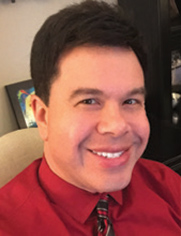Challenges in ADHD Care for Children of Color
PART ONE
Melvin Bogard interviews Roberto Olivardia
Attention Magazine October 2021
Download PDF
Melvin Bogard, MA, interviews Roberto Olivardia, PhD
 African Americans of all face many barriers in getting a proper ADHD evaluation, diagnosis, and treatment. Roberto Olivardia, a clinical psychologist based in Boston, Massachusetts, recently spoke with Melvin Bogard, CHADD’s director of multimedia content, about the specific barriers for Black children and how they are often misdiagnosed with behavioral problems or overdiagnosed without proper assessment. Practitioners need to be mindful of the historical mistreatment of African Americans by the medical community in order to better serve these patients. Dr. Olivardia talks about empowering African-American parents and families so they can advocate for their children, especially when facing a culturally insensitive school system or medical clinician. He exhorts practitioners to understand the cultural context of where people of color are coming from and to help increase awareness of ADHD in the African-American community.
African Americans of all face many barriers in getting a proper ADHD evaluation, diagnosis, and treatment. Roberto Olivardia, a clinical psychologist based in Boston, Massachusetts, recently spoke with Melvin Bogard, CHADD’s director of multimedia content, about the specific barriers for Black children and how they are often misdiagnosed with behavioral problems or overdiagnosed without proper assessment. Practitioners need to be mindful of the historical mistreatment of African Americans by the medical community in order to better serve these patients. Dr. Olivardia talks about empowering African-American parents and families so they can advocate for their children, especially when facing a culturally insensitive school system or medical clinician. He exhorts practitioners to understand the cultural context of where people of color are coming from and to help increase awareness of ADHD in the African-American community.
As part of our ADHD Awareness Month coverage, we bring you an excerpt from the All Things ADHD podcast, edited for length and clarity.
MELVIN BOGARD: Do cultural barriers exist in the healthcare and school systems when correctly identifying ADHD in African-American children? And if so, how do we change the narrative?
ROBERTO OLIVARDIA: Absolutely. In the research literature, studies actually show that ADHD can be either underidentified and underdiagnosed or overdiagnosed—and for all the wrong reasons. First, underidentification: What we know is that there are a lot of barriers that get in the way for children of color—having insurance issues, being uninsured, underinsured. A lot of the time school systems are the gatekeepers of first identifying students, and children of color might be in school systems that may not be particularly adequate or staffed or have the specialists to make those kinds of identifications.
Studies show that children of color are sometimes more likely to be diagnosed with another issue and not ADHD, such as being oppositional or having conduct disorder, as opposed to seeing that their challenges could be ADHD or an undiagnosed learning disability. Studies also show that healthcare providers carry a lot of implicit biases around how we diagnose. There was a study done where physicians were given the same scenario of symptoms; in one scenario there was a Caucasian individual and in another, an African-American individual. The African-American individual was more likely to be given a diagnosis of schizophrenia versus the Caucasian individual of ADHD. There is a lot of bias that we have to continue to unpack around how we look at behavior and understand the cultural context of behavior.
Now, where ADHD can get overdiagnosed: sometimes children of color get diagnosed with ADHD without really looking at other potential issues, such as trauma, such as the experience of racism and the distrust that a lot of people in the African-American community have toward medical professionals, which is warranted and justified if we look, historically, at everything from the Tuskegee experiments and a lot of other injustices that have happened in the African-American community. So, a lot of times providers have to understand that when you’re working with a person of color that, and this is regardless to a socioeconomic status, studies show that in African-American communities, there’s a real vulnerability that they feel, especially for a parent who’s bringing their child to get diagnosed and what that means. There’s a lot to unpack there.
Let’s discuss the challenges of African-American children if they are not properly diagnosed or treated for ADHD in early childhood. What are some of the problems you’ve seen in your practice?
With ADHD in general, when you don’t have proper identification, proper diagnosis, then you don’t get proper treatment and management. This is a diagnosis that can cause real ruin in somebody’s life if it’s not managed and not treated well. And when it’s unmanaged, people with ADHD have higher risks of substance abuse, are going to face more problems in jobs and potential unemployment or relationship problems. Russell Barkley published a study recently looking at the health outcomes of people with ADHD, where they have a shorter life expectancy—I should say, unmanaged, untreated ADHD. I always want to clarify that.
So, now imagine an individual, a child of color who is not being identified, and on top of that is being labeled as being oppositional, as being difficult, and then growing up in a culture in which there are institutions that make it very difficult for people of color to move forward. There are a lot of racist institutional policies and all of those implicit biases, that whether it’s professionals within the school system, and just the trauma of racism and the trauma that all of that entails really makes for a perfect storm in terms of all of these problems that can happen, and particularly in adolescence. And for a child of color who might grow up in a single-parent family, it’s very difficult if they aren’t being identified, and they might not have the monitoring or supervision because their parent might be working two or three jobs that it makes it really, really difficult. And then by the time that person is a teenager, and let’s say they’re using substances, and they’re doing things that one should not be doing, it’s very easy to say, “Oh, this is a bad kid,” as opposed to looking down the line and understanding, well, if you felt like a failure every day when you went to work, and for kids school is their job, and you weren’t being properly identified, diagnosed, and helped, then how are you going to think about yourself? And then on top of that, again, the experience of racism, of discrimination, of prejudice on top of that. So, there’s this sort of double impact that that experience can have.
What are some factors that can increase disparities in diagnosing and treating ADHD?
In general, there’s a lot of stigma about mental health diagnoses. I would say that, thankfully, the stigma of the ADHD diagnosis overall is decreasing; however, I should say that in a lot of studies they’re showing it’s decreasing among white individuals. So, a lot of young people that I work with who are white will say, “Oh yeah, I have lots of friends who have ADHD and are on medication. It’s no big deal.” With communities of color, it’s very important for mental health professionals and for physicians to understand that it has a very different context. In a lot of immigrant families or families of color, if there’s a problem it’s looked at as this is a problem of the family. And a lot of times parents feel like it’s an indictment on their parenting in that way, that they’re not whipping their kids into shape, they’re not keeping them in line in that sort of way, because discipline is really important.
And so, part of our job as professionals is to understand where they’re coming from. And it’s not that they’re being parents, they’re being defensive, or they’re not being cooperative, or they’re being distrustful as if it’s unwarranted. We have to understand where they’re coming from, and our education and outreach has to be focused on, “Look, this is not an indictment on your parenting at all and your kid is not a bad kid, it’s that this is something.” We have to really explain the science behind it, that they can still be successful individuals. Because imagine, again, for every parent who has a child of color, they’re always thinking and worrying about the kind of world that they’re going to grow up in. We know that parents of children of color have that conversation about dealing with police, and that’s something that a lot of white parents don’t think about. So, similarly, we have to have the conversation around ADHD diagnosis and especially about treatment.
Now, what studies also show is that with communities of color, that even when children of color are diagnosed, they’re not getting the proper treatment. So now you have these barriers to even get diagnosed, to get identified, to get assessed, and then there are these barriers of treatment. And part of it is on one end, again, of insurance issues, of accessibility. There is a dearth of clinicians of color; I think five percent of physicians are African-American, a very, very low amount. So, we have work on trying to bring people of color into the field.
With regards to medication, there’s this resistance that you’ll often see in communities of color: “Well, what is this medication going to do?” There’s distrust. A professional can look at that as, “Oh, this is someone who’s defensive and whatnot” without looking at the cultural context of historically what that means for somebody and explaining, “When we’re giving a medication, we’re not trying to have your child necessarily be like everybody else, as much as be the best version of themselves.”
So, I see a large factor in decreasing disparities in ADHD care is our ability—and this is why I’m glad we’re doing this podcast—of just getting the messaging out, and the outreach out, of how we have to speak to these communities as opposed to the assumption being, “Oh, they need to understand, or they’re being defensive, they’re closed-minded,” those kinds of things. And we need more representation, too. There are some celebrities out there like Simone Biles, the Olympic athlete. She talks about having ADHD. And will.i.am—I’m a big music fan—so will.i.am of Black Eyed Peas talked about having ADHD. And then there are people who, I’ve not heard them themselves say, but reportedly may have it. And we want to try to bring out famous people who have ADHD, who just provide some more visibility and let people know that it’s okay, and that this is not something that’s going to follow a child in a negative way.
Which, again, if you are a parent of a child of color, you worry about their future, you worry about them having as many options, because you know unfortunately today that there are going to be forces that work against them. So, you don’t want a label that you think is going to limit them, that is going to brand them and have them stand out in a negative way. We need to let them know that’s not the case. In fact, if it’s not diagnosed, if it’s not treated, then the problems that can come from that are the things that end up labeling them in negative ways and limit their opportunities. This is actually meant to increase their opportunities in that way.
What do you suggest to African-American parents of children with ADHD when advocating for their child with a culturally unaware school system or medical clinician?
I think, first and foremost, is to really empower parents to know it’s okay for them—and more than okay—to ask for more if their child is not getting what they need. And I think a lot of times, particularly in communities of color, the messaging is to not ask for much and to be silent and be grateful for what you have and that sort of thing, as opposed to, well, wait a minute, my child is flailing here and they’re not getting the services that they need. And it can be, again, to understand if you’re a parent or parents of color and you’re sitting across a room of people who are not of color in the school system, where there’s an inherent power dynamic, that that’s going to bring up a lot of different feelings and a lot of different emotions.
I want to let parents know they’re entitled, their child is entitled to an education. We all are entitled to that. To let them know too that sometimes, even with the assessments, studies show that there’s often a disparity when children of color are assessed or any child is assessed. You have a parent fill out a survey, teachers fill out surveys, and you look for consistencies. Well, studies show that in communities of color you’ll often see these inconsistencies, where teachers might rate one way, parents rate another way. And that doesn’t mean that there isn’t ADHD. It’s understanding that if you are growing up in a single-parent family, the level of responsibilities you might have in that household are far greater. And so, in some ways I’ve heard from people who have said, “I didn’t have room to procrastinate at home because I had to cook dinner. I needed to help my mom who was working two, three jobs. And then in school, it just was a totally different thing.” It’s understanding, not just looking at these surveys and saying, “Oh, you don’t check all the boxes,” and really understanding and letting parents know to share their observations, share their story in terms of what their child is going through. Find people in the community. A lot of times word of mouth and working with other parents, hearing from other parents who have had children in that way in communities of color, whether it’s through Facebook groups or things like that, but also through churches or through venues in which people feel a safety and a trust.
And it’s okay for parents to know that they can bring an advocate to an IEP meeting to support them, because meetings can be very emotional, especially if somebody is saying, “Oh, no, we don’t think your child needs that.” Or, again, if a child is being diagnosed with ADHD and they may not have ADHD. It could be a child who is not eating because there’s food insecurity in the household, that they’re not sleeping well.
We always want to be looking at the big picture. And this is true for everybody. But what we know from the research is that children of color are—again, that overdiagnosis or underdiagnosis—is that we’re missing the mark, that there isn’t enough attention looking at the context of how all of these things play out. And so, for parents, what is important is to educate themselves, listen to these kinds of podcasts, get information, talk to their child’s pediatrician, talk to trusted people in the community, really look at resources that help them, just give themselves information, and come to those school meetings with that information.
Any closing comments?
Anyone who hears this message, if this motivates them to do a research study, to do a podcast about this subject, to interview clinicians of color, physicians of color, and talk to their communities, to religious leaders around how we can look at the conversation of mental health. That’s what we just need to do: keep talking.
This podcast is supported by Cooperative Agreement Number NU38DD000002-01-00 from the Centers for Disease Control and Prevention (CDC). The contents are solely the responsibility of the authors and do not necessarily represent the official views of the CDC.
Listen to the recording at https://podcasts.chadd.org/e/challenges-in-adhd-care-for-children-of-color-pt-1/.
 Roberto Olivardia, PhD, is a clinical psychologist and lecturer in the department of psychiatry at Harvard Medical School. He maintains a private psychotherapy practice in Lexington, Massachusetts, where he specializes in the treatment of ADHD, executive functioning issues, and students with learning differences. He also specializes in the treatment of body dysmorphic disorder, obsessive-compulsive disorder, and eating disorders in boys and men. He currently serves on the professional advisory boards for CHADD, ADDA, and the National Association for Males with Eating Disorders.
Roberto Olivardia, PhD, is a clinical psychologist and lecturer in the department of psychiatry at Harvard Medical School. He maintains a private psychotherapy practice in Lexington, Massachusetts, where he specializes in the treatment of ADHD, executive functioning issues, and students with learning differences. He also specializes in the treatment of body dysmorphic disorder, obsessive-compulsive disorder, and eating disorders in boys and men. He currently serves on the professional advisory boards for CHADD, ADDA, and the National Association for Males with Eating Disorders.
 Melvin Bogard, MA, is CHADD’s director of multimedia content development. He is passionate about supporting and empowering marginalized communities, fighting for social justice, and reducing ADHD stigma by leveraging social media platforms as a conduit to learn and meet these communities’ needs and distribute resources.
Melvin Bogard, MA, is CHADD’s director of multimedia content development. He is passionate about supporting and empowering marginalized communities, fighting for social justice, and reducing ADHD stigma by leveraging social media platforms as a conduit to learn and meet these communities’ needs and distribute resources.
Other Articles in this Edition
Resilience and ADHD During the Pandemic
Challenges in ADHD Care for Children of Color
PART ONE
Pay ADDention™! I’m a Teen Expert on ADD
Study Skills for Thriving with ADHD
Raph’s Tale, A Fable About Neurodiversity
Black Adults Who Live with ADHD
